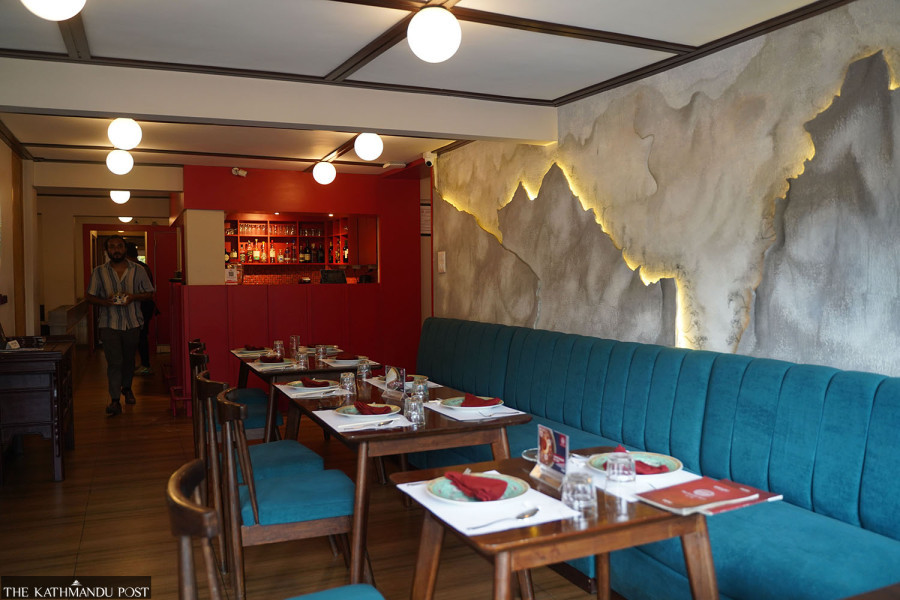Money
As inflation soars, consumers are putting brakes on restaurant spending
Millennials, who were regular visitors to restaurants, are leaving the country in droves significantly impacting consumption, mainly at restaurants.
Sarahna Khadka
Chain restaurants are grappling with slowdown in sales, with customer footfall decreasing.
Industry watchers say customer traffic to restaurants has been falling since last year, moderating back to where they were a decade ago, largely attributed to the economic slowdown.
There are two key factors, according to industry insiders, inflation eats into consumer budgets and many have been cutting back on their restaurant visits. Secondly, droves of youths who were regular visitors to restaurants are leaving the country in droves significantly affecting consumption.
On the other hand, with high interest rates and high inflation, restaurants have been raising menu prices over the past few years.
Burger House and Crunchy Fried Chicken, one of the fast-growing franchises in Nepal which have opened over 140 outlets within the Kathmandu Valley, says sales have slumped.
“We were forced to shut down a few outlets when the government banned operating restaurants from basements," said Saru Lama, administrative head of Burger House and Crunchy Fried Chicken.
“We, however, have increased our menus with more trendy items including bubble tea, to attract customers.”
It has also opened a new outlet in collaboration with Melung Thalkali, as Thakali recipes are gaining popularity nowadays.
Changing food habits and a busy lifestyle have led many to flock to restaurants increasing the demand, especially after the Covid pandemic. Many returnee migrants, too, began dabbling in the field after banks started to provide loans at low-interest rates.
Remittance income boomed post-Covid and, accordingly, restaurants started to pop up in every nook and cranny of the Valley.
Ever-expanding Syanko Katti Roll, established in 2002, soon became popular in the Kathmandu Valley. The chain sells flatbread wraps stuffed with spiced meat or vegetables, among other things.
“We’re seeing a noticeable impact on visitation trends because of inflation,” said Khadga Poudel, administrative manager of Syanko Katti Roll.
“The number of customers nowadays is about 60 percent of the pre-pandemic base,” he said.
Until 2018, chicken rolls and veg rolls, the most popular choices cost Rs140 and Rs110 respectively. Today, a chicken roll is priced at Rs220 and a veg roll at Rs150.
"Food prices have been climbing consistently. The inflation is still very high and so is the competition in the restaurant business.”
He, however, said that compared to other upscale restaurants, prices at Syanko Katti Roll are still reasonable.
Poudel said that a popular street-side outlet in the chain has sales above Rs60,000 per day, and in a less crowded area, daily earnings hover around Rs20,000.
Poudel claims that weak regulations regarding franchises have also affected their business.
“Nearly 30 Syanko franchise outlets have discontinued collaboration. They are now operating independently without seeking our permission. It has become difficult to take action against them,” said Poudel.
According to Poudel, the investment to open a Syanko franchise outlet ranges from Rs1.5 million to Rs10 million, depending on the location and space.
Restaurant owners say that the people who frequent restaurants are youngsters.
Economist Chandramani Adhikari told the Post in a recent interview that when over a million people, particularly youth, leave the country for foreign jobs annually, including the students, it largely affects the consumption pattern.
In Nepal, domestic demand is supported by consumption.
According to a report of the National Statistics Office, formerly the Central Bureau of Statistics, the money spent by Nepalis on consumption was estimated at Rs4.41 trillion, which is 90.7 percent of the GDP, in the fiscal year 2021-22, ending mid-July 2022.
An estimated 15,000 restaurants and cafés are operating inside the Kathmandu Valley and most of the ventures were opened after the Covid pandemic, when banks eased the interest rates, which are less than 7 percent per annum.
To attract customers, restaurants with great interior design, ambience and exotic cuisines popped up from the riversides to rooftops.
Some popular franchises like Bota Momo have introduced combo meals and new recipes like Chaat Momo, Kid’s Meal Combo, and Momo Chowmein Combo.
The Bota Group has expanded its business to include Thakali cuisine from its Daura Thakali restaurant, established in 2022.
Now it has three outlets in the Valley.
Many believe that the customer number has not decreased, but rather, customers are spending less.
Araniko Rajbhandari, president of Restaurant and Bar Association Nepal (REBAN), said competition is getting intense in the restaurant business.
He said that the customer numbers have dispersed with the boom in restaurants.
“There are new eateries, thematic cafes and foreign cuisine restaurants—which are not only attracting customers with food, but with their great interiors.”
“Eventually, the customers benefit from high variety and competitive prices.”
As the number of customers visiting restaurants physically has dropped sharply, online orders, however, have increased since Covid, when the country imposed lockdowns.
Delivery apps like Bhojdeals and Foodmandu have thrived.
Syanko partners with Foodmandu, Bhojdeals, and Pathao for online delivery.
According to Poudel, in some outlets up to 50 percent of sales are through online orders.
According to recent data, Foodmandu is connected with around 800 restaurants across the Kathmandu Valley and employs about 200 people to meet the daily demand.
Shyam Mali, head of brand and marketing at Foodmandu, said that the online delivery demand on the popular app has been growing steadily since the Covid pandemic.
Our fleet of delivery persons has grown by nearly 50 percent compared to the lockdown days and the overall increase in orders through the app is roughly 25 percent over the last few years.
“The market is still growing, but by a little every day,” said Mali.




 14.12°C Kathmandu
14.12°C Kathmandu













